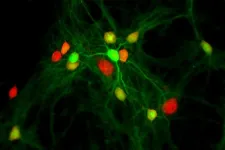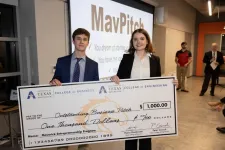(Press-News.org) People with a nonfatal opioid overdose who have access to a peer support program while in the emergency department are more likely to initiate treatment and less likely to have repeated overdoses, according to a Rutgers Health study.
The study is the largest study on outcomes associated with emergency department-based peer support for opioid use disorders and was published in JAMA Network Open online ahead of print in the April 2024 issue.
According to the Centers for Disease Control and Prevention, nonfatal drug overdoses are treated in emergency departments, which historically have stabilized and then discharged patients without linking them to treatment options.
The study analyzed the outcomes of the Opioid Overdose Recovery Program, a New Jersey Division of Mental Health and Addiction Services–supported program that connect patients admitted for opioid overdose to emergency departments with peer recovery specialists—people who have lived experiences with substance use disorders who provide nonclinical assistance, recovery support and referrals for assessment and substance use disorder treatment.
“People who themselves are in recovery can relate to someone who is going through the same experience,” said Nina Cooperman, associate professor of psychiatry at Rutgers Robert Wood Johnson Medical School, a member of the Addiction Research Center at Rutgers and an author of the study. “If a patient is ready to enter treatment, the peers will facilitate the transfer; if they are not, the peers maintain a relationship with the patient after discharge for eight weeks to provide support and facilitate linkage to treatment if they later become motivated.”
Researchers looked at 12,046 adults on Medicaid between ages 18 to 64 who were treated for nonfatal opioid overdose from 2015, when New Jersey launched the program, to June 2020 at 70 acute care hospitals. They compared the 180-day outcomes with those treated in hospitals that offered a peer intervention and those at hospitals that didn’t.
They found an increase in the probability that a patient treated for opioid overdose in hospitals that were affiliated with the peer recovery program would initiate medication for opioid use disorder treatment within 60 days of discharge and a decrease in the probability of repeat overdoses as compared to patients treated in hospitals that did not offer the program.
“However, we found a lot of variability among hospitals in achieving those outcomes,” Cooperman said. “Our findings suggest that emergency department-based peer recovery support programs are associated with increased initiation of medication for opioid use disorder, but that outcome likely depended on additional factors, such as program characteristics, program implementation success and availability of other substance use disorder services either in the hospital or in the community. Evaluating these factors is the focus of our ongoing research.”
“Peer recovery support can help reduce repeat overdoses, but it may be more effective when implemented alongside other hospital-based interventions, like emergency department buprenorphine initiation and naloxone distribution,” said lead author Peter Treitler, an assistant professor at Boston University School of Social Work who performed this research as a research program manager at the Rutgers Institute for Health, Health Care Policy and Aging Research.
Other authors include Rutgers faculty, Stephen Crystal, Joel Cantor, Sujoy Chakravarty, Anna Kline, Cory Morton and Kristen Gilmore Powell and Suzanne Borys at the New Jersey Division of Mental Health and Addiction Services.
END
From opioid overdose to treatment initiation: outcomes associated with peer support in emergency departments
Rutgers Health researchers publish largest study on outcomes associated with hospital-based peer support programs after opioid overdose
2024-04-16
ELSE PRESS RELEASES FROM THIS DATE:
NIH awards $3.4 million to Wayne State University to investigate biomarkers for better reproductive success
2024-04-16
DETROIT - The diagnosis of male fertility has not changed in decades and primarily relies on conventional semen parameter analyses such as sperm count, motility and morphology, which are poor predictors of couples’ reproductive success.
A new $3.4 million award to the Wayne State University School of Medicine from the National Institutes of Health aims to overcome the limitations of conventional semen analyses by examining mitochondrial DNA levels in sperm as a novel biomarker of sperm fitness.
The project will be led by School of Medicine Professor of Obstetrics and Gynecology J. Richard Pilsner, Ph.D., M.P.H. ...
New study shows corporate misconduct at home hurts sales overseas
2024-04-16
New research in the Global Strategy Journal has bad news for companies struggling with corruption, discrimination, or sweatshops in their supply chain: corporate misconduct demonstrably hurts international sales. Consumers and investors increasingly read about unethical business practices globally and demonstrate their displeasure locally.
“Socially irresponsible acts transcend geographic boundaries and negatively affect foreign subsidiary performance,” said Nuruzzaman Nuruzzaman of the University of Manchester, one of the study’s ...
Take it from the rats: A junk food diet can cause long-term damage to adolescent brains
2024-04-16
A new USC-led study on rats that feasted on a high-fat, sugary diet raises the possibility that a junk food-filled diet in teens may disrupt their brains’ memory ability for a long time.
“What we see not just in this paper, but in some of our other recent work, is that if these rats grew up on this junk food diet, then they have these memory impairments that don’t go away,” said Scott Kanoski, a professor of biological sciences at the USC Dornsife College of Letters, Arts and Sciences. “If you just simply put them on a healthy diet, these effects unfortunately last well into adulthood.”
The study appears in the May issue of the journal ...
Fralin Biomedical Research Institute team unpacking genetic mysteries of childhood epilepsies
2024-04-15
Epilepsy is a brain disorder that causes recurring seizures.
It is one of the most common neurological diseases, and it affects approximately 50 million people worldwide, according to the World Health Organization. In 2023, nearly 450,000 children in the United States were diagnosed with the disease.
Virginia Tech researchers at the Fralin Biomedical Research Institute at VTC are exploring how gene variants identified in children with severe epilepsy can have an impact on neurons, leading to abnormal ...
UNC-Chapel Hill researchers discover new clues to how tardigrades can survive intense radiation
2024-04-15
University of North Carolina at Chapel Hill researchers have discovered that tardigrades – microscopic animals famed for surviving harsh extremes – have an unusual response to radiation.
Led by UNC-Chapel Hill researcher Bob Goldstein’s lab, the new research paper published on April 12 in Current Biology reveals new details on tardigrades’ responses to radiation. Radiation has long been known to damage DNA, and in humans, DNA damage from excessive radiation exposure can lead to diseases. But the tardigrades have an unexpected way to correct the damage.
“What we saw surprised us,” said Goldstein. “The ...
UT Arlington prioritizes entrepreneurship efforts
2024-04-15
Universities are engines for economic growth that today are supporting technology development, innovation and economic advancement as never before.
With the launch of its Center for Entrepreneurship and Technology Development (CETD), The University of Texas at Arlington is beginning a new era of support for student and faculty entrepreneurship. The center, whose mandate also includes supporting the region’s vibrant innovation economy, will expand UTA’s engagement with public and private partners everywhere.
“CETD fosters a vibrant and supportive atmosphere ...
Ochsner Health receives 2024 Top Workplaces Culture Excellence Awards
2024-04-15
NEW ORLEANS, La – Ochsner Health is the recipient of the 2024 Top Workplaces Culture Excellence awards in four distinguished categories: Innovation, Work-Life Flexibility, Leadership and Purposes & Values. These accolades are administered by Energage, a purpose-driven organization that develops solutions to build and brand Top Workplaces.
The Top Workplaces program has a 17-year history of surveying and celebrating people-first organizations nationally and across 60 regional markets. Top Workplaces awards are based on feedback from a research-backed employee engagement survey.
“It is an honor to receive ...
Are these newly found rare cells a missing link in color perception?
2024-04-15
Scientists have long wondered how the eye’s three cone photoreceptor types work together to allow humans to perceive color. In a new study in the Journal of Neuroscience, researchers at the University of Rochester used adaptive optics to identify rare retinal ganglion cells (RGCs) that could help fill in the gaps in existing theories of color perception.
The retina has three types of cones to detect color that are sensitive to either short, medium, or long wavelengths of light. Retinal ganglion cells transmit input from these cones to the central nervous system.
In the 1980s, David Williams, the William G. Allyn Professor of Medical Optics, ...
Annals supplement highlights important new evidence readers ‘may have missed’ in 2023
2024-04-15
Embargoed for release until 5:00 p.m. ET on Monday 15 April 2024
Annals of Internal Medicine Tip Sheet
@Annalsofim
Below please find summaries of new articles that will be published in the next issue of Annals of Internal Medicine. The summaries are not intended to substitute for the full articles as a source of information. This information is under strict embargo and by taking it into possession, media representatives are committing to the terms of the embargo not only on their own behalf, but also on behalf ...
NIH awards $2.3 million grant to University of Oklahoma for gene therapy research
2024-04-15
NORMAN, OKLA. – University of Oklahoma engineering researcher Sangpil Yoon, Ph.D., has been awarded a $2.3 million grant from the U.S. Department of Health and Human Services, National Institutes of Health, for his project titled “Development of protein-based nanostructures activated by ultrasound.”
The five-year grant is part of the NIH’s Research Project Grant (R01) program, which supports cutting-edge health-related research and development initiatives. Yoon’s funding, totaling $363,919 for ...
LAST 30 PRESS RELEASES:
New knowledge on heritability paves the way for better treatment of people with chronic inflammatory bowel disease
Under the Lens: Microbiologists Nicola Holden and Gil Domingue weigh in on the raw milk debate
Science reveals why you can’t resist a snack – even when you’re full
Kidney cancer study finds belzutifan plus pembrolizumab post-surgery helps patients at high risk for relapse stay cancer-free longer
Alkali cation effects in electrochemical carbon dioxide reduction
Test platforms for charging wireless cars now fit on a bench
$3 million NIH grant funds national study of Medicare Advantage’s benefit expansion into social supports
Amplified Sciences achieves CAP accreditation for cutting-edge diagnostic lab
Fred Hutch announces 12 recipients of the annual Harold M. Weintraub Graduate Student Award
Native forest litter helps rebuild soil life in post-mining landscapes
Mountain soils in arid regions may emit more greenhouse gas as climate shifts, new study finds
Pairing biochar with other soil amendments could unlock stronger gains in soil health
Why do we get a skip in our step when we’re happy? Thank dopamine
UC Irvine scientists uncover cellular mechanism behind muscle repair
Platform to map living brain noninvasively takes next big step
Stress-testing the Cascadia Subduction Zone reveals variability that could impact how earthquakes spread
We may be underestimating the true carbon cost of northern wildfires
Blood test predicts which bladder cancer patients may safely skip surgery
Kennesaw State's Vijay Anand honored as National Academy of Inventors Senior Member
Recovery from whaling reveals the role of age in Humpback reproduction
Can the canny tick help prevent disease like MS and cancer?
Newcomer children show lower rates of emergency department use for non‑urgent conditions, study finds
Cognitive and neuropsychiatric function in former American football players
From trash to climate tech: rubber gloves find new life as carbon capturers materials
A step towards needed treatments for hantaviruses in new molecular map
Boys are more motivated, while girls are more compassionate?
Study identifies opposing roles for IL6 and IL6R in long-term mortality
AI accurately spots medical disorder from privacy-conscious hand images
Transient Pauli blocking for broadband ultrafast optical switching
Political polarization can spur CO2 emissions, stymie climate action
[Press-News.org] From opioid overdose to treatment initiation: outcomes associated with peer support in emergency departmentsRutgers Health researchers publish largest study on outcomes associated with hospital-based peer support programs after opioid overdose



